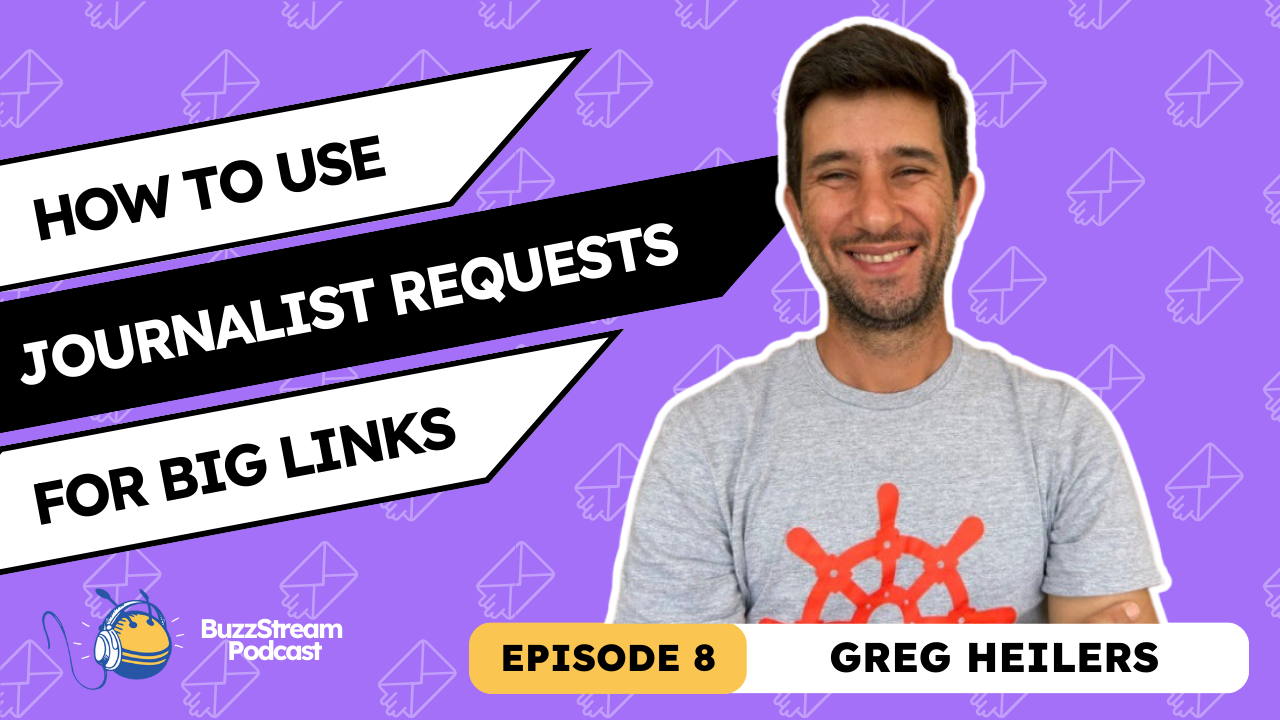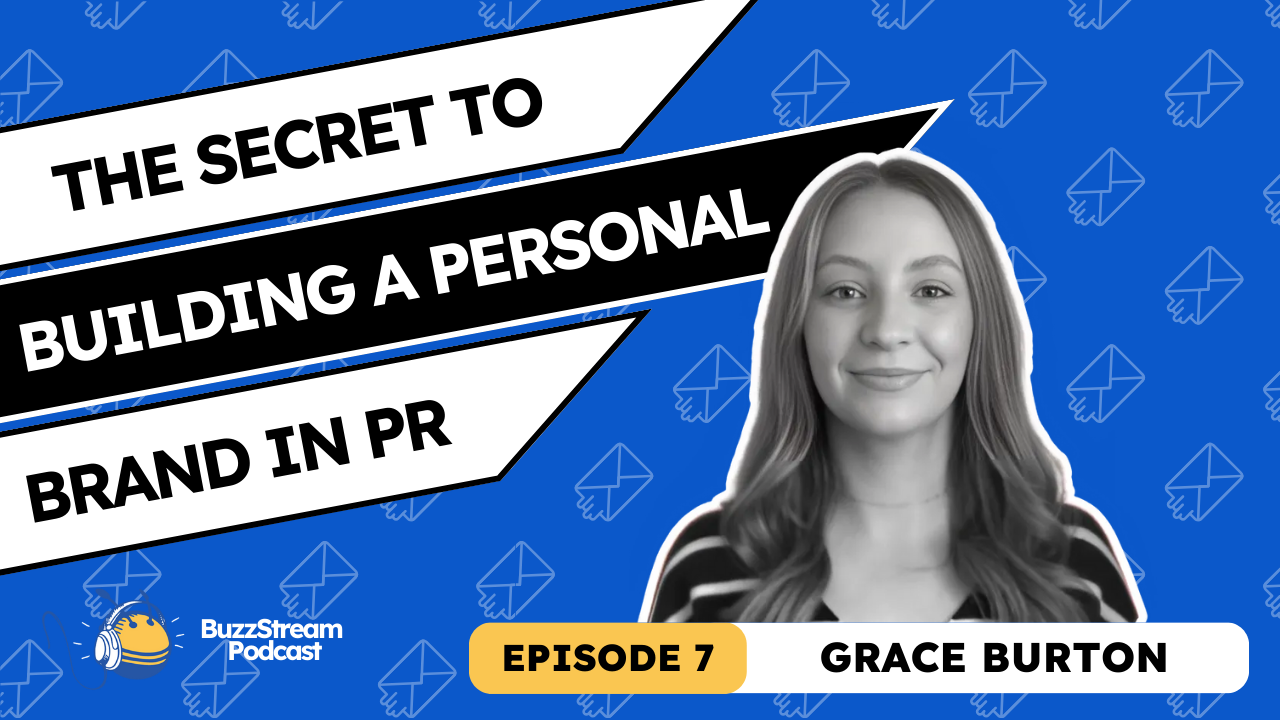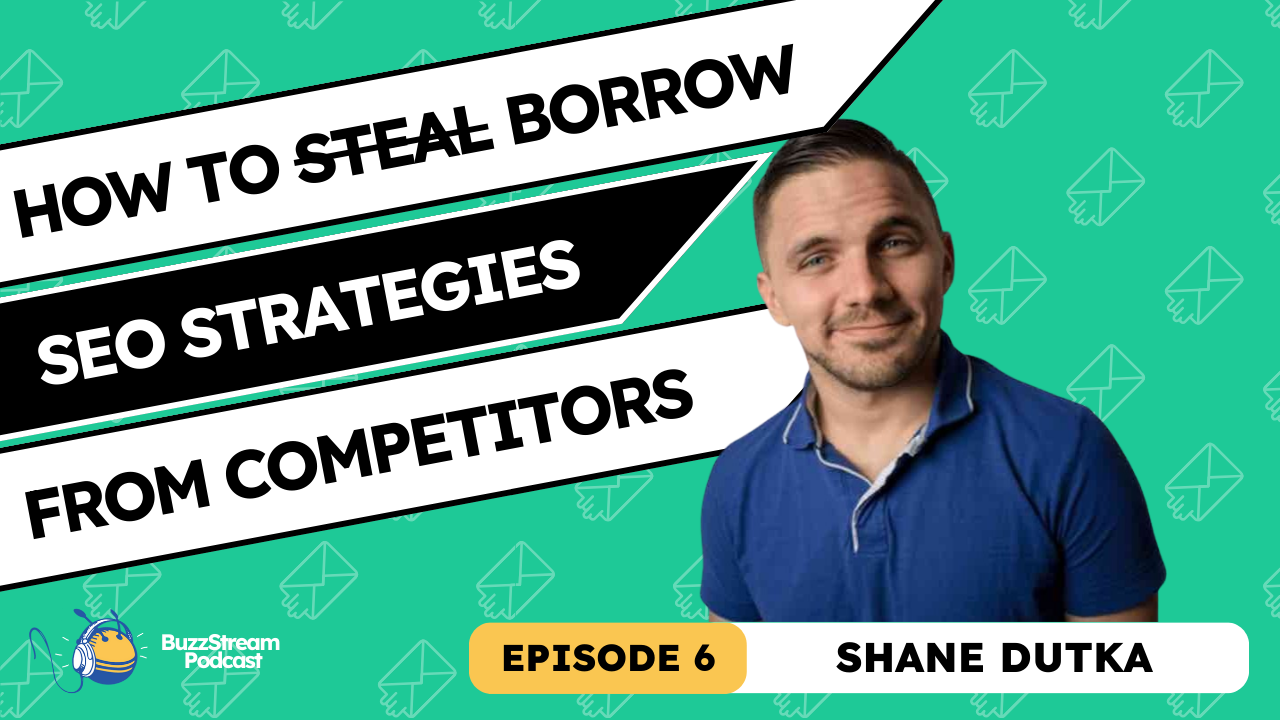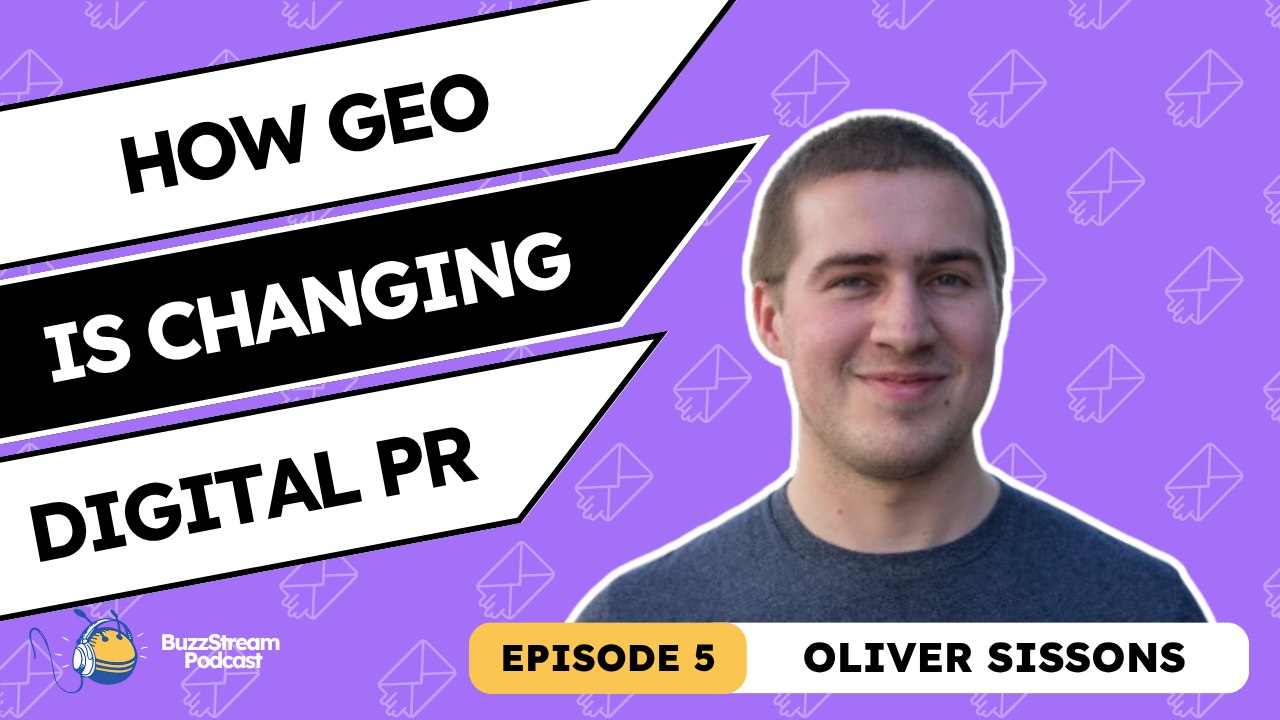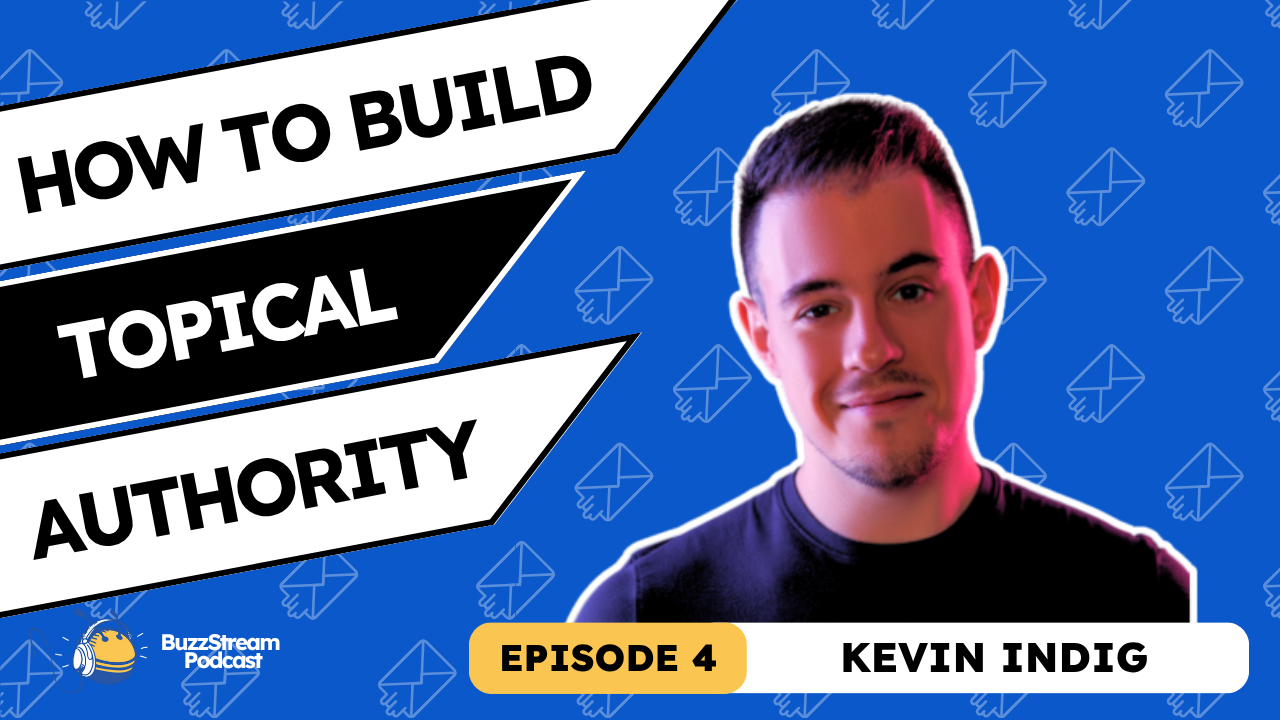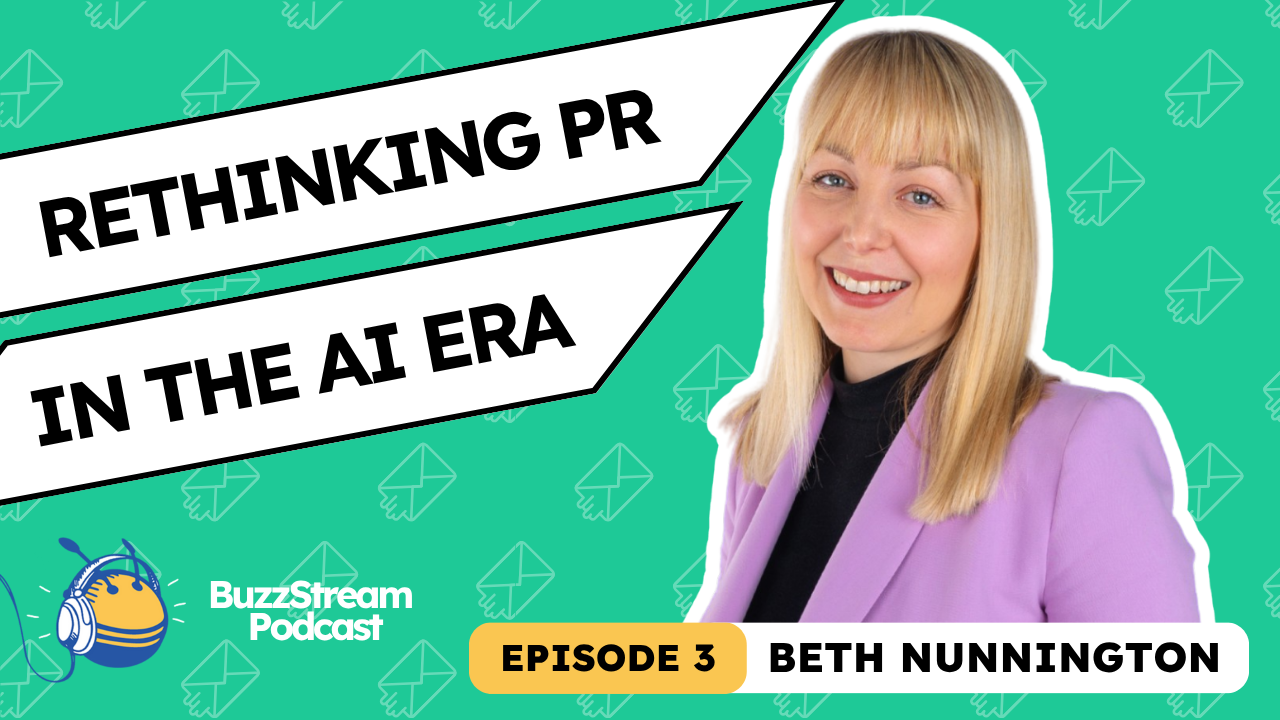Table of Contents
I met Jasper Morris because he and I were both panelists on a Digital Olympus webinar where we talked about link building.
Jasper is the Director of UK-based link building agency Profit Engine, which focuses on guest posting and niche edits.
As you know, I’m still pro guest posting but I do think the game has changed a bit. After hearing Jasper speak about guest posting on the panel, I thought he had some unique, helpful takes on how to have success with it today.
So, if you are thinking of doing some guest posting in 2025, I highly suggest giving this a watch/listen.

Actionable Takeaways
Based on our chat, here are some actionable takeaways for PRs.
1. Prioritize Authority and Relevance
Always evaluate potential guest blogging sites for authority and relevance to your niche. These are the core pillars for effective link building.
2. Develop an Evaluation Scoring Method
Jasper talks about how Profit Engine employs a 16-point checklist to evaluate sites for factors like:
- Traffic trends (consistent or growing traffic is a good sign).
- Inbound-to-outbound link ratios (ideally 3:1 or better).
- Referring domains and spam indicators (e.g., nonsensical ranking keywords or link farms).
3. Avoid Over-Reliance on DR
Domain Rating (DR) can be manipulated. Supplement this metric with other checks, such as organic traffic and keyword quality. He pointed out how some sites, like the one you see below, rank for nonsensical keywords to boost their traffic numbers, which helps them sell more links on their site.

4. Outreach Emails Should Address Pain Points
Jasper’s outreach emails focus on solving a specific problem for the recipient. In their case, they use Surfer to point out potential missing content or content improvements needed to outrank the recipient’s competitor. Then offer to write it for them.
5. Avoid the Author Bio Links
Modern-day guest blogging’s best practice is to place your target links naturally within the content itself rather than in author bios.
6. Link Building Shouldn’t Happen in a Vacuum
You can just build links and expect leads to come in. Integrate guest blogging efforts with social media, YouTube, and an updated blog ecosystem to create a robust content strategy.
7. Don’t Neglect Site Quality
Before investing in links, ensure the target website has a modern design, good site speed, and convertible traffic to avoid wasting resources.
8. Paid Links Require Due Diligence
According to Jasper, paying for links can be ethical and effective if:
- The site is high-quality and relevant.
- The link adds value to the audience.
- The site owner maintains consistent standards.
Transcript
Here’s the slightly edited transcript from my talk with Jasper.
Can you tell me a bit about Profit Engine?
Um, and it sounds like. Potentially, if I’m getting this right, it’s a kind of family-oriented business. So I’d love to hear a little bit about profit engine.
Jasper Morris: Sure. Absolutely. So yeah, my dad started Profit Engine around nine years ago and he was getting into the SEO space and he was like, what should I do?
You know, what sort of things should I do?
And he chose the most boring part of SEO, which is link building.
So he, yeah, he, he got, he got into it.
He got into link building. And then, um, he actually hired my brother straight from college.
So he never really had a real job, right? So he’s been here working with us in the family business, but as a strong head of operations now, which, you know, he’s really enjoying.
I joined a couple of years ago, and then I sort of, I left for a bit.
I actually went and worked for another link building agency—my dad got me that job—to just sort of learn more.
Then, after that, a couple of years later when I was sort of ready to join back in the family business, we decided to, to give it a go and do it all again.
So yeah, it was a big risk, but it was, it’s just paid off.
So, well, I think over time as we’ve sort of grown in our careers, we’ve been able to sort of work together well over the past couple of years.
So it’s been a surreal privilege.
Vince Nero: Yeah. That’s really cool.
I mean, I mentioned, we were talking about this earlier. I. My brother actually helps edit these podcasts for me.
So I like the idea of keeping it in the family.
Well, let’s jump into this before we get too far afield.
I want to come back to the family thing because you got some interesting stuff going on Instagram.
The reason I really wanted to talk to you was because we were on this link building panel and they did a good job of sectioning off experts—or whatever you want to call it — in the different kind of focus areas.
So you’re in link building agency. And it sounds like abig focus of yours is more of what I’ll say, like the traditional link building methods, right?
So like the guest posting link insertions, do you do like broken back link building that, that sort of stuff as well?
What kind of link building does Profit Engine focus on?
Jasper Morris: We just focus on guest posts and niche edits, because it is easy to scale, essentially.
Just those two methods are our main way to do it.
Vince Nero: And so I want to start with kind of like a broad, maybe like philosophical, theoretical, question here.
And it’s just this idea that to me.
It seems that the appetite for link building has, I don’t know if it’s waned, but maybe it’s changed in the past year.
I mean, this has been a very tumultuous year with Google algorithm updates, AI overviews, the Google leak, all this stuff.
So I feel like it’s been going back and forth.
And we’re feeling this in BuzzStream from a sales perspective, but like people just aren’t quite sure.
They’re asking a lot more questions about the impact of link.
So I’d love to hear your take on the market, the business right now.
And if you’re feeling that on your end as well.
Has the market for link building changed recently?
Jasper Morris: Sure. Yeah. I think a lot of link-building agencies struggled after the HCU update because it just wiped a lot of their sites that they were linking to or that we get links from.
Also, there are a lot of affiliate businesses that disappeared, and that was a massive part of link-building for a lot of affiliates.
I feel like that’s the main way they write, they invested in links and now all of a sudden they weren’t getting brand searches.
It wasn’t like that they were just buying links and competing on a keyword basis.
And now a lot of that sort of link building is gone.
So it’s, I think it’s affected a lot of agencies for sure, which is why we sort of, we sort of went before even the HCU, we weren’t really working with affiliates.
We were working more with SEO agencies and in house marketing teams.
So it’s affected us in terms of from a data point of view, but I definitely think things are changing.
And you know what I said this on another podcast the other day is that I do think we are coming out of the golden age of link building.
I think in terms of like just people buying sheer amount of links, any links possible, things are changing for sure.
I don’t think link building is dead by any means.
And I don’t think people will never need links.
The whole of the Google algorithm is based on links. So I think things are definitely changing in terms of there’s less people that actually need links, right?
And especially sort of guest posts and niche edits.
And that, that means the market has definitely changed in that.
So, like these small sites, completely not buying and not building any links, not buying any links anymore.
I don’t think it will stay like this, like in this past couple of months, I think people will change and adapt and they’ll find new ways of making money and they’ll find new ways of making money through SEO, right?
I think that’s currently how it is right now.
When things change and adapt and people find new methods, they’ll still need, they’ll still need links at the end of the day.
Vince Nero: Yeah. Yeah. I mean, I think that’s an important message is links seem to and probably will always be a big part of the algorithm.
Google’s algorithm.
And, I’d, I’d love to hear kind of your thoughts before we get into like the tactical stuff of guest posting is— you mentioned affiliate sites getting hit and they’re not really a big buyer anymore or, or customer of this sort of link building—so, like, who is the ideal customer?
What does the ideal site look like for people who should be investing in guest posting?
What is the ideal site that should be investing in guest posting?
Jasper Morris: I think e commerce for sure is, is definitely a big one.
So you’ve got like CBD, just any sort of product like is a massive investor for guest posts.
You’ve also got stuff like insurance, right?
So that’s a massive industry as well.
So, the insurance niche is very competitive, including life insurance and stuff like that.
Really competitive service.
There are two main ones that we actually working with in the moment.
It’s just e-commerce on insurance, and that also for a link-building agency is sort of like SEO agencies as well.
So those SEO agencies usually should reach down.
Then you have local SEO —people building for local SEO, like the home improvement niches and stuff like that, especially in the States.
It’s not so much like that in the UK, but in the States there’s so many home improvement site sites.
So it’s a massive market there.
They’re the markets that we’re working with mainly.
But yeah, it’s mainly anything that’s now extremely competitive in the service is really still where you’ll need your digital PR, but also to make a difference, you will need guest posts and niche edits.
This is something that people should be investing in if you are in an extremely competitive search.
Vince Nero: Yeah. Yeah. Somebody kind of said this to me. I was talking to one of the guys that owns Traffic Think Tank, Ian Howells, we were having a discussion about just links in general.
And one of the things he pointed out, which I thought was a good point—and you’re kind of echoing here—s this idea of like, um, using links as a kind of like competitive advantage.
There’s going to be industries where you might have the same exact service as your competitors. Right?
Like these like comparison sites. I feel like this are good examples of that.
Or maybe you’re a local insurance company.
And from a sales perspective, you might not be all that different from the insurance company down the block.
So it seems like links are kind of a competitive advantage in those instances.
Do you feel like in those cases where you don’t have a key differentiator, and links are kind of what you’re, you’re focused on, do you also need to have like a blog and sound SEO and, you know, traffic going to your site or can you just inject links and, and that’s enough?
Do you think you need a blog to do guest posts and niche edits?
Jasper Morris: I think it now takes a lot of different variations.
I definitely think you need a blog.
I also think you should be investing in social as well.
I believe that there should be an SEO; this is a thing with affiliate sites. Affiliate sites could just invest in SEO and that was it. That’s all they needed.
Brands today need to invest in their social.
They need to invest in other forms of marketing as well as their SEO. It should be a whole package.
And like you said, blogs, I think we’ve been updating our blog recently.
We’re then going to take our blog, and we’re going to repurpose it, and put it on YouTube.
So we’re going to make YouTube content from that.
And then you push that to your blog when you post it on YouTube; it all should be connecting in an ecosystem.
And I think that’s what’s really important.
But then you invest in that with links.
And that is, like you said, it’s going to give you competitive edge.
Like I was saying, for some businesses, they could just do SEO. And it’s fine, but the landscape of SEO has changed.
Where you need other parts and different things to build your brand, build your image, and then push your SEO simultaneously.
So it’s, it’s, you know, it all, all molds together now.
Vince Nero: Yeah. Yeah, you can’t really take any shortcuts. It seems like these days.
Jasper Morris: Someone will find one on I Twitter and it’ll be absolutely crazy. But yeah, they’ll, they’ll find something.
But yes, it, I mean it’s, it’s a lot harder. It’s 10 times harder, but that doesn’t mean that you shouldn’t do it.
Right. And that’s something that’s, I see some posts on LinkedIn recently where it’s like don’t invest in SEO anymore. And it’s like, okay, well, whoever’s listened to that, then that that’s your fault sort of thing. I mean, if that guy’s not invested in his SEO, fair enough. Right.
But I mean, all these things work together, right?
And, and it should be viewed as a whole marketing strategy.
And if you take one of those parts away and another competitor is filling that gap, then you’re losing business.
Vince Nero: Do you guys specifically look at that from a customer standpoint?
Like, hey, they have some traffic coming to their site. They have some content before you take them on as a client.
Do you need traffic coming to a site before you can start doing guest posting?
Jasper Morris: Yeah. So we have a check that we do.
It’s a quick check to just see if there’s any content or technical issues.
And we do, we do that because there’s no point investing in links if your site just looks so bad.
I’ve seen so many bad signs and I say, “look, Guys, before you invest in me, you need to go and either redesign your site.”
The site speeds low.
It looks like it was built in the mid two thousands.
It just needs to work.
I think a lot of people need that sort of guidance because they just think that they can build links and that will sort of solve their problems.
Once you get to a certain point where your site’s fine, it’s technically fine, the content’s good and that traffic is going to convert, I’m going to feel much more comfortable building links because then I know you’re going to get results.
So, that’s what I tell people when they come to us.
It works both ways. There’s no point investing in links if the traffic’s not going to convert.
So yeah, we do those checks.
It’s not a very like complicated check.
Not an-depth SEO audit. It’s basic.
And we also just give it a smell test.
So, like, we go over the site. If I just think like, mate, to be perfectly honest, I just think this needs a redesign. This needs to be improved.
I think a lot of people respect that as well, because you know, I’m not just going to take the money and just say, let’s build loads of links, and it will solve all your problems.
Vince Nero: Right. At the end of the day, you’re going to be building these links and you’re gonna be like, well, our traffic’s not going up.
It’s like, well, your site looks like garbage. What I told you in the beginning.
Right. Yeah, exactly.
Jasper Morris: And I need to say, I can’t build a case study from that.
I mean, so there’s no, there’s literally a waste of everyone’s time and money.
Vince Nero: And I like that idea of kind of the smell test. Like, I think you can. You can learn so much, or you can just rely on your gut.
I call it the eye test.
You look at a lot of these sites—and I want to get into this next—but, when you’re evaluating sites, which to pitch guest post, I feel like that’s important as well.
So, um, let’s transition here into the guest posting strategy.
So first thing I’m gonna kind of set the stage like.
So, your site, you have traffic, you have a blog, and you’re ready to get into guest posting.
Where are you looking first? What are the criteria for the sites that you’re trying to find, to get guests posted?
How do you evaluate sites that you want to get guest posts on?
Jasper Morris: Yeah, absolutely. Absolutely.
So I think there’s two main pillars to links, right?
The very, very basic pillars, which are authority and relevance, right?
They’re two the two main principles that you should be looking at for links.
Where it can go a bit more into detail is when you’re having a look at the site.
So how much traffic that it gets, and that’s good tell for authority as well.
You shouldn’t just be basing it on the DR of the site.
That’s very easily, easily manipulated.
And there’s ways you can check whether that has been manipulated, which I’ll go into with the other checks.
So the DR and site traffic is essential.
The traffic trend is significant as well.
Many sites got wiped out after HCU because the trend just went off.
Then we have a whole 16 point checklist.
Another really important one to look at is inbound to outbound link ratio.
So the amount of inbound links coming into the site and the amount of ones that are going out.
If there’s hardly any inbound links and loads of outbound links, then you’re it’s probably a link farm, right?
In fact, it is a link farm, bro.
So they’re basically using the site just to sell links. So you can wipe off a lot of sites by looking by and looking at the data.
I know of a good way of looking at it the actual referring domains and keywords of the site.
So, if the referring domains of the site are a lot of jumbled up text dot com with a DR but zero traffic, then what they’re doing is they’re using that to manipulate the DR of the site.
So that’s just a rubbish site.
It’s the same thing with the keywords as well.
So if you go on an address and it’s like a load of jumbled up keywords and they’re ranking top for it. They just manipulated it to seem like it’s ranking for more keywords than it is.
So that’s a good way of identifying sites that are, that that are pretty poor.
So there are three main ways that we check, but you know, traffic is really important to the trend of the traffic.
If the traffic is going up like that, that’s perfect.
And just making sure there’s no spammy keywords or spamming referring domains and then inbound to outbound link ratios.
I think they’re the main ones that eliminate a lot of sites, right?
So that they’re the key principles that I would say any sort of people out looking to build links should use.
You’ll save yourself a lot of, a lot of time and investment.
Vince Nero: When you get into inbound outbound links, what does that ratio look?
What is a good ratio for that?
What is a good inbounce to outbound link ratio.
Jasper Morris: So it’s three to one.
So let’s say if you have a hundred inbound links, I’m looking for more than 300 outbound links.
then usually we’d, we’d, uh, surmise that as a, uh, as a, as a link Now that can depend on. The, uh, that
Jasper Morris: So yeah, it’s a, yeah, we can do some digging on that as well.
So,, we’ll have a look at the whole site in general.
But the first two, probably to look at is referred domains and the keywords. Those two of them, the real ones.
And then with with the inbound to outbound link ratio, then we know as a combination, it is probably a link farm.
Also traffic trend as well as the traffic trend of the site, just going down is so easy to just be like, “well, this is not even worth, um, having a look into.”
Vince Nero: So the keyword one, just so I understand, you’re looking for them ranking for keywords irrelevant to their own site, like, say, it’s a. VPN site in the ranking for the best cities, restaurants and
Jasper Morris: So what people can do is basically make a random word.
It’s like a jumbled up letter, right?
So it’s, it’s completely random. And what they’ll do is they’ll rank top for that.
And wbecause it’s just a random word and the right for loads of keywords that are just completely random.
So it shows that they’re getting good at ranking for loads of keywords, but it’s not.
It’s just made up.
So it’s interesting and its a really good way of just getting rid of sites because you know the process of what they’re doing.
They’re trying to write for keywords to manipulate the site.
So then if they’re trying to manipulate the site, they’re probably trying to sell links.
If you look at a standard link farm, like a lower level link farm, that’s the first thing they’ll start doing.
Vince Nero: Yeah, I gotta check that out. I hadn’t seen that before. What about, um, AI content, like the content on the page?
How deeply do you look at that?
Do you look at AI content on the page?
Jasper Morris: So, the thing is I think we’re in AI content that a lot of people are doing it.
Like there’s some amazing tools where people are doing it so well.
We don’t personally invest in AI content, but there’s people that are doing it really, really well.
And, it’s really hard to negate.
Even some of the checkers aren’t on a hundred percent it.
We basically just have a look at the content, good or bad. Right?
That’s pretty easy to do with reading the content.
There was bad content before AI.
So you can still use this same sort of like reading through—okay, does this make sense? This is actually good— and stuff like that.
And I think that’s probably a better way to do it because I don’t know if Google can even right now identify AI content.
As you saw at first, it was like no AI content. No one use AI content.
And now they’re like, “well, if you want to use AI content guys, that’s absolutely fine by the way.”
So yeah, I try and not use the, like going through and checking AI content cause we’re just not too sure right now.
And I don’t want to build processes within our business to negate something that actually is okay.
Vince Nero: Okay. So once you’ve identified a site, um, Let’s talk about kind of the outreach process. What does that look like? Are you pitching ideas for them?
What do your outreach emails look like?
Jasper Morris: It’s funny. So, when we first started doing outreach, we would make these long emails like, “hey, we really love your site. The content’s amazing.
I just saw a picture of your dog on the site and the dog’s the most beautiful dog I’ve ever seen in the whole world. Would you like, can I play some content on your site?”
And that usually worked back in like nine years ago.
It was really, it was really rare to buy a link. You would write these really nice emails and people would just like be able to use place links all day long.
It was great.
Nowadays is completely different.
The value of what people see is entirely different to what it was nine years ago.
So the outreach message that we use today is, “Hey, I can see your competitor is outranking you with this piece of content.
We’ve wrote a similar piece of content. Would you like us to write one for you?”
And, basically what we’re doing is trying to get to the pain point of their competitors outranking them.
They’ve got a piece of content where they could generate more traffic, and we will use that to say, “Hey, let us help you write this piece of content.”
So we use Surfer to do that.
We pitch using Surfer and we actually do this for link inserts as well.
So, an outreach message that we’ve been doing, which has been going down really well is, “Hey, we analyze your site using Surfer and the content is not very good here and here. Would you like it to rewrite it for you?”
We rewrite it and then insert our link into it.
So, that’s a good way to show value now because people just don’t have the time to go through the content and change it.
And they don’t have the time just to write content all the time and do analysis like that to see where they’re missing or whether competitors outranking them.
So that is the best way now.
Keeping it short, sweet to the point: Your competitors outrahnk you for this; you need this; we’ll help you do it.
Keep it short and sweet.
Vince Nero: Yeah. I love that.
You’re almost turning into a mini consultant for them, right?
Like you’re an SEO agency for them that’s writing this content. Yeah, that’s fantastic.
I worked at Siege Media for a long time, and I started there 2016, and I feel like that was exactly kind of that era that you said, where it’s just like, Hey, like personalizing to a point where, you know, you’ve hooked them and they were just happy to have somebody reaching out.
There was a time like something happened, some course or something went out and all of the bloggers realized that they could be asking for money for this.
Jasper Morris: Yeah. It was the travel bloggers.
That’s where we noticed it started, right? What happened was it’s like, Oh, I can charge $200 for a link, or sometimes we’re getting some ridiculous one, like $1,000.
And they’re thinking, this pays for my holiday in Rome.
That’s where I think that’s where it started because that’s, we noticed it start in that industry, right?
So yeah, I’d be starting with those pesky travel bloggers. Right.
Vince Nero: Not to go too far aside here, but with BuzzStream, we’re working on this State of digital PR and one of the things, it’s this big survey, one of the questions is like, what is the easiest industry to get links in?
And most people say travel, because I think it’s, you’re not reaching out to bloggers, you’re reaching out to journalists in the travel space, which is like a totally different,
I had thought that too, I was like travel, but I’m realizing like, you know, it’s not digital PR.
You’re not necessarily reaching out to other bloggers.
You’re reaching out to the journalists who cover travel space.
And travel travel publishers and stuff.
So yeah, just a quick aside there.
Okay. So, using Surfer and coming up with some keywords their competitors are ranking for.
So the niche edits and then there’s other, the other strategies is like writing the posts from scratch.
So, in those cases where you’re writing the post from scratch, guest post, you’re not like adding your name as the author, right?
Are they kind of authoring it themselves? And you’re just kind of providing the content.
Like, rather than those sites that, you know, it’s by admin or by guest author or something, you know, or they have a custom, you know, it is Jasper Morris, but your bio doesn’t necessarily reflect the experience or like, because that, yeah, yeah, yeah.
That that is where to me a lot of these sites go wrong is those author kind of bios and stuff. Do you I mean do you find that as well?
Do you ghostwrite the articles for the sites you pitch guest posts to?
Jasper Morris: Yeah.
We just say “look this is gonna be your content for your site. And you can put it as that you wrote it.”
I think but a lot of people would have the actual link based in their author bio, right?
And that is the traditional guest post book.
I don’t know many agencies that are doing that anymore.
I think the term guest post has changed with that as well.
Like they get the link should be within the content of the actual post itself.
And the author bio, you can just say, just put it as yourself.
It strokes the ego of the actual person, the site owner.
They can be like, look at this piece of content I “wrote”.
Yeah, it just works. It works best for that.
This is where it’s changed. I think a few years ago, people would have. (I think we actually did it as well.)
I’m pretty sure some links we have built for clients that we’ve had for like nine years and if you go back, it will have Hugo as the bio with his picture on that he wrote.
But now the link is always in the content.
I just think the mindset has changed a bit.
I think site owners would be like, “well, this is my site and you’ve wrote this content, so you put it on.”
I just don’t think site owners care about that as much anymore.
That’s what we’ve noticed anyway.
Vince Nero: Yeah. I mean, I, I would definitely agree there. I mean, so it sounds like you avoid those “write for us sites” where expressly even if it’s a quality site that offers guest contributors that’s not what you’re doing.
Do you avoid those sites that say “Write for us”?
Jasper Morris: Well, it just depends—Typical SEO answer—but that does depend if this if the site is “write for us” and it meets all the other metrics, then usually we would go with that.
But mass majority of the time it says “write for us” and it doesn’t match all the quality checks that we see.
So, yes, I think, if the site is good. Right.
Then a “Write for us” at the top doesn’t necessarily mean it’s bad in terms of getting a link from that.
But you just got to have a look at that—in those cases, outbound to link inbound ratio, right?
So if it’s got, if it’s tons of people writing for that site, there’s lots of outbound links and probably not worth your time.
So, yeah, I think we have our core principles that we have in our in our 16 point checklist that we is is sort of biblical for us that we’ll use first and then stuff like “Write for us”.
We actually do have “write for us” as a as a check, but it needs to be taken in context of the of the whole site.
So I don’t necessarily think it’s a bad thing all in all, but. It depends.
So, as I hate to say, but we always say it.
Vince Nero: No, I mean, yeah, I don’t think there’s ever going to be like a hard and fast rule in any of the SEO stuff.
Like, I know that’s like a trope is like people hate when it’s the, when you say it depends, but like there’s a reason why you have to say, it depends because everything’s going to be different.
And to build off of one of the things you said with some kind of analysis I just did. So I don’t know if you saw Ahrefs recently released this post of 50 best-bootstrapped backlink builders in 2024.
So basically they looked the past year, they looked at these sites and they were, I mean, they were mainly SaaS companies except for one.
So, I think it was meant to be a SaaS site or a SaaS analysis.
So, you know, they looked at ones that didn’t have a high traffic value, which determined they were kind of like bootstrappers.
So I’m looking at this post and I’m realizing it doesn’t get into the industries or the traffic or how the links impacting the traffic.
So anyway, I ended up doing this big analysis and looking at every one of the 50 sites and like how they built their links in the past year.
Like what was the primary method?
And one of the things that I did notice applicable to this conversation is this idea of like the write for us.
And it wasn’t a huge majority, but I saw that most of the sites on this list were hit by some Helpful Content Updates.
And others were hit by Link Spam.
So, going into the Helpful Content Update, then I started doing some digging and seeing like, okay, what could be some of these reasons that some of these sites were hit by Helpful Content?
And a few of them had those like guest contributors, right?
Like it was like most of the metrics were solid.
Obviously like the traffic was dipping. But the content for the most part looked good, but then I’m digging in and finding it, okay? There’s like 500 posts or something, and 400 of them get no traffic at all.
And I’m digging in, and it’s like, okay, those 400 posts that are getting no traffic, they’re the guest contributor ones, right?
They’re the ones that have been written for us; guest contributed, not really a strong keyword focus.
It has all those signals that you’re saying. It’s like one outbound link, right?
And it’s to a very specific, you know, Service page or something. It’s clearly, uh, you know, a placement.
So I do think there is probably something to those sites where they’re just inherently going to be lower quality because you don’t, if you’re accepting guest posts, guest contributors, you know, oh, we have 250 writers, it’s like, how quality can that content be?
Not to say that there are sites that don’t do that, but like, yeah, to me, that’s not a red flag, but like, it’s a warning actually to check the, the quality.
Jasper Morris: Yeah, check the site. And then, and then I suppose it’s like if they just accept it straight away and there’s no vetting process, then that probably makes it a lot of red flags as well.
There’s something else I think as well with that sort of type of post is that you can’t add internal links to a post like that if you’re not directly speaking with the site owner that really cares about the site.
So if it’s “write fort us” as you put a post, who’s in charge of then?
Who’s adding and doing proper SEO on the site and adding internal links from other pages to that post that you’ve done?
So, that’s another really important metric. And I’d love to see the data of how many actual internal links that these sites have as well between each other.
Or they’re just like just random, just random pages on the site with random content that’s looks like it’s been wrote by an eight year old or probably by myself.
I’m so bad at writing.
But I think you’ll probably spot, there’s probably these 500 random posted by random people. And none of it is, you know, half of it’s half decent.
So yeah, I, I think you’re probably right.
And this is something that you should do the smell test on. Go through, just have a quick look at those sites and the structure of them.
Vince Nero: All right. A couple other questions before we, we close out here. And this is a big one. Do you think people should pay for links? And I ask this specifically because in the guest posting world, right?
Like I know you’re very familiar with this, but more often than not, you’re going to reach out to these people. And even if you are providing them a lot of value, they might still be like, yeah, that’s great idea. But it’s a hundred dollars, 200, whatever. Do you think that is okay? If it’s behind the scenes, not overt, what’s your take on paying for links?
Do you think paying for links is bad?
Jasper Morris: Well, I honestly think the best outreach message you could ever do is outreach like maybe 10,000 sites that are really good or like, you know, in your niche and say, “Hey, for the first five people that get back to me, I’ll pay you 1,000 for a link on your site.”
You will get some amazing links.
So I think there’s the question of — is it going to harm your site first?
If you buy a link, is that link directly bad?
Google doesn’t know if you’ve done a direct transaction, um, no matter what anyone says, they will never know if you’ve done a direct transaction with someone over a site.
I saw a wild take on LinkedIn of what someone comments on my post saying they can read your Gmail; they’ll find out.
And I thought I was, I thought I was a wild, wild take. I thought I was mental.
And then the second thing, which I think gets the most drawback on whether you should buy a link or not is: is it ethical to buy a link, right?
Google guidelines say it’s not ethical.
And personally for me, I don’t think Google are the most ethical company in the world, right?
I don’t think anyone should, if someone’s basing the ethics of whether something’s right or not on Google, then I think there’s more significant questions that you need to ask yourself, right?
That’s my personal opinion.
Uh, each to their own.
If people think that’s ethically bad, then that’s fair enough.
I’m not going to judge you on that.
I think personally, it’s okay to buy links on the right sites.
Don’t buy links on links farm.
This is why we have checks. You ‘re actually doing the site owner a favor, especially on days like this, right?
If it’s a decent site, if it’s a genuine blog or a genuine business, you’re doing them a favor because they’re probably struggling to make money online.
You’ll build it if it’s a good link. You know, then you’re doing your client a favor. You’re ranking the client site.
We buy a lot of links.
We rank a lot of sites, right?
If I was buying links and not getting results, then I’d move away from it.
But I think the massivething is, I got literally, I got sent the other day, Vince, a list of digital PR sites, massive, massive sites where I can buy a link from.
If people don’t think it goes on, you can buy a link on most sites these days, right?
And no one’s going to say, if you buy a link from the BBC, that’s bad, right?
In terms of an SEO point of view.
But the people definitely think ethically it’s bad. There’s definitely, I think, more of an ethical stuff to the digital PR side of it.
It’s probably a conversation for another day.
But when it comes to my guess, those are probably niche edits.
I don’t think it’s bad to buy links. I think you buy them on the right sites and you’re all good.
But it’s strange. I think people have moved.
I don’t know if you’ve noticed this Vince, but I’ve noticed a shift from it though I think 12 months ago, if I said I buy links, I would get slayed on, on, on LinkedIn, right?
But I think Google has genuinely hurt people.
Businesses have genuinely suffered because of Google. The white hat SEOs that were saying, do this, do this.
The sites have been hit.
Google has shown its cards is going to go and play for the high authority.
It’s going to work with the high authority sites. It’s going to deal with Reddit and stuff like that.
So I just don’t think people can justify saying anymore that you should be listening to the big boss Google.
I think there’s a shift. I’ve noticed a shift anyway. I think when speaking to people I’ve noticed a massive, a massive shift from it.
But yeah, in short, I don’t think it’s bad to buy links.
I think it’s bad if you buy links on, on rubbish sites. If you’re gonna go on Fivrr and spend a hundred dollars on some absolute garbage, then that is bad.
And then selling that for hundreds and hundreds of dollars, then that’s pretty bad.
But if you’ve genuinely put outreach in, if you’ve made a really good piece of content for someone and then you exchange it, a value for that, to put that on and that link helps your client that they paid you money for, I see nothing wrong with that.
What are your thoughts? I’d be interested to hear your thoughts.
Vince Nero: Yeah. I mean, I just, I think there, the two things, I mean, I agree. It’s like, if you’re smart about it.
You know, you really have to do your due diligence.
The thing that worries me is you’re putting your faith in the site.
Right, like you’re paying them with the idea that they’re going to uphold their quality and uphold their, you know, like they’re not one day going to put their site on some database that will then lower the quality.
It’s like the Brian Dean’s thing, like bad neighborhoods, right?
They might be very strict with their, their quality, but then maybe a new person, new SEO content marketer, director of content marketing comes in and like, they’re not as, you know, strict. And so that’s the only thing I worry about with that.
And that’s where I just tell people it’s a risk.
And if you’re, it’s a calculated risk, if you’re willing to do it to the point where, and it gets back to what you said initially. It’s like, it’s not like a cure all, right?
Like just getting links is not the cure all. It’s fuel on the fire. Like you, you need a sound SEO, you need, you need a blog.
You need some, so otherwise you’re just pure and pouring fuel into nothing.
And the other question that this brings up for me, I was going to ask, is this idea of like link marketplaces, right?
So to your point, like I get these lists all the time as well. I’ve been on plenty of these link marketplaces.
Like I bought links at one point in my career and I just was so soured on the experience because of the quality of the sites.
But I am curious to me, all it would take is Google to go into any of these link marketplaces. Like quite frankly, I don’t know why they haven’t done this or maybe they have, but like just go in on any of these sites, right?
Like sign up under some pseudonym and just download the list.
And it’s like, okay, we’re going to devalue all of the links from these sites.
You’re not getting penalized, but you’re just not getting anything out of it.
I don’t understand why they haven’t done that because to me, and again, you can be super diligent in your process.
But all it would take is Google to just do something like that.
And it pulls the rug out from under you. So again, like that’s where the risk takes, like if you’re willing to pay all this money and have Google potentially pull out the rug, the rug like that, that’s risky to me, but what, what is your take on that?
Like the, the, the link marketplaces and like those online databases that exist that are pretty much overtly, you know, out there, I don’t know if you were at. Were you at Brighton SEO this year?
Jasper Morris: No, I wasn’t there.
Vince Nero: They had John Mueller was doing Q& A and he was positioned directly across, like he had a booth and he was positioned directly across from like this big link marketplace website.
Jasper Morris: That is pretty crazy, isn’t it? It’s an Orwellian SEO world, right? God, John Mueller and a link marketplace.
Vince Nero: That’s the quintessential kind of picture of the state of SEO.
It’s like this thing is something that happens. And I don’t know how Google feels about it, but yeah.
What’s your take on that?
Whats your take on link marketplaces?
Jasper Morris: And it wouldn’t surprise me if they’ve done something like that.
And this is why you’ve got to do some genuine outreach, right?
That’s the first thing that we’re doing when we take on a client.
We do some genuine outreach, finding new sites, finding sites that rank in the SERPs.
Um, and this is why I think it’s good to, like, stuff like traffic trend is important, because if you are, let’s say you are going on a marketplace like that, the traffic trend should, if it’s still going up, there’s probably some value still in that site.
But, like you said, it really wouldn’t surprise me if John Mueller after Brighton SEO just goes on logs on it down, downloads him all.
He goes, “I’ll show him”.
Uh, so it wouldn’t surprise me, but this is why you can still do some due diligence.
I think that this is why we’ve always avoided this.
People that have always asked us, “Oh, just send us, send us your sites and I’ll choose one” or like that.
And we’ve always stayed away from that because I just don’t think that’s the process that you should be doing actually to get the best links possible.
So I think that, these marketplaces are obviously a really good business model for some—even SEO agencies—to easily come on and just buy links.
But you’d hope and pray that at least they have considered what you’ve said, and are doing any sort of due diligence on these sites before just buying them.
Because they think it’s on a marketplace, they should buy them.
I haven’t really used a marketplace because we’ve just never really needed to.
But I’d be interested to see if this, this may be actually some due diligence or some stuff that they actually say on there to say, “Hey, by the way, you should probably check your site before you build a link on them.”
Vince Nero: I would imagine like 90 percent of their customers don’t care that much.
They’re just like, here’s this, $200 is my budget. I want to buy five links, da 30, whatever, you know,
Jasper Morris: We spoke about this on the digital Olympus chat. We’ve like agencies that —for local agencies with the SEO agencies that we work with that do local,—it’s like they don’t care about links.
They don’t care about that sort of stuff.
They just want to, they just want to see. They want to get more leads, right?
So they don’t care about any sort of way that you’ll get into the link marketplace, which is the last thing they’re thinking about.
So it’s probably the last thing the SEO agency is also thinking about when they’re buying links on that, right?
They’re just thinking, I need to get leads.
I need to get my client, right. And I need them to get leads, right?
So it’s interesting, isn’t it?
I hope that whenever we take on a client or when we’re looking to speak to client, there’s conversations that we’re having that they’re ready to build the links are ready to do that.
And you’d hope that the link-building marketplaces are doing some sort of check or something to help their clients be able to do to get the best quality from what they’re selling.
It’s an interesting one. Um, it’s why, yeah, like why we have travel sites.
Vince Nero: And I’ll close with this one last question here to wrap up the link buying thing. Is it a necessity?
Like, do all of the people that you reach out to ask for money?
Or are there ways to do guest posting without having to pay?
Is it possible to get links through guest posting without buying them?
Jasper Morris: We still get some for free. I mean, it’s great, it’s a great feeling when we get them for free, and we’re all high fiving, you know,
Vince Nero: I mean, is it just like, it’s a newer site?
Like what would it be when we, like, they don’t understand the game and they don’t realize they can ask for money? .
Jasper Morris: Yeah. Yeah. Pretty much.
It’s a new site or sometimes like we’ve had relationships with site owners for years, right?
So sometimes we can just message and speak to them and be able to get a link for free.
So it was stuff like that because we’ve had that relationship for so long.
But yeah, you can still get a free link.
So that’s really the goal for us when we’re doing outreach.
We would like to get them free.
And that’s the approach that Dad always had when we started doing it.
It’s like free links.
We want to get free links.
We want to get free links.
And that is still the approach that we have. It should get to the stage now where even after a while when we’ve had a relationship with a site, and it’s like, yeah, you know, Hugo, my brother, who’s head of operations, you know, we need to, we need to charge on this one.
We just been paid 200 by another guy.
And, so it completely depends on as well on the niche and industry.
But yeah I think things will… I’m hoping that with better outreach and stuff like that, you know, we can get some more, uh, get some more free links. Still, I do genuinely think that the longer this goes on, um, that, you know, probably people would just be going to more paid and I think that’s going to affect it too.
I think it’s going to really affect it.
Vince Nero: Well, yeah, I think you’re right about that. Well, let’s not leave it on the somber note there. I want to, I want to quickly give you a chance to, uh, you were telling me about some cool stuff that you guys are doing on, uh, your own socials and to promote the agency and, um, you got your brothers, you got your family going.
So, uh, You can find Jasper on his Instagram, but you also have an Instagram for Profit Engine. Yeah, where you’re doing some fun, yeah, My Profit Engine, and you’re doing some fun stuff. Tell us about that quickly.
What are you working on with your Instagram these days?
Jasper Morris: Yeah, so it’s like the sort of light-hearted skits, just of us in the office.
It’s very, it’s shot a lot like the office, like the U.S. office, it’s shot a lot like that.
It’s a lot different to—we hope— other link building agencies out there.
You can actually find more serious content on my LinkedIn and on Instagram, where I talk about link building strategies.
We have the AI ranking blueprint, which we help people with obviously building links as well.
So, yeah, for the fun stuff, go on My Profit Engine and then you’ll probably see me on LinkedIn or or me on Instagram there for some more serious, uh, uh, link building stuff.
Vince Nero: Yeah. Love it. Oh, well, Jasper, this has been great, man.
Jasper Morris: No worries at all. I really appreciate it Vince. It’s been a pleasure. Thank you so much.

 End-to-end outreach workflow
End-to-end outreach workflow


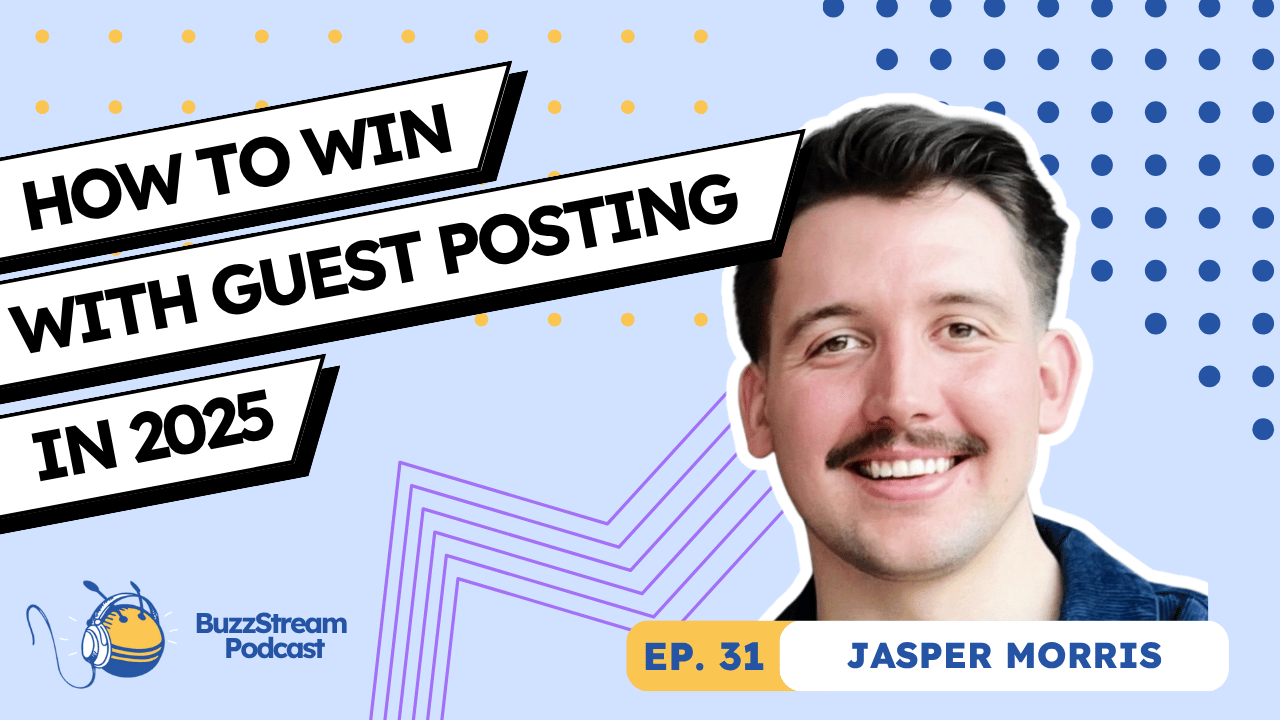
 Check out the BuzzStream Podcast
Check out the BuzzStream Podcast

